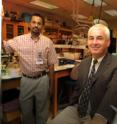Brain-nourishing molecule may predict schizophrenia relapse
A factor that helps optimize brain formation and function may also provide clues about whether patients suffering with schizophrenia are headed toward relapse, researchers say. Over the next two- and one-half years, they are regularly measuring levels of brain-derived neurotrophic factor, or BDNF, in the blood of patients with schizophrenia to see if the pattern of their rise and fall is a good indicator that patients are headed for trouble, say Medical College of Georgia researchers.
"If you had something that would give you a better inkling that somebody is going to get ill, that would be extraordinarily helpful," says Dr. Peter S. Buckley, schizophrenia specialist who chairs the Department of Psychiatry and Health Behavior in the MCG School of Medicine. "It's a little bit of a shot in the dark, but the payoff would be huge," he says of the study that piggybacks on another federally-funded study looking at whether injectable medicine, rather than tablets, can help deter relapses.
Not taking their medicines as prescribed is a big reason patients relapse but science has already shown that BDNF levels can start dropping even when they do, says Dr. Anilkumar R. Pillai, MCG neuroscientist who studies BDNF and other cell-nourishing trophic factors. That drop likely indicates the drug is becoming less effective and a relapse is imminent, the researchers say.
Decreased BDNF levels already have been associated with relapsing bipolar disease and depression, Dr. Buckley says. Dr. Pillai and others have shown that the BDNF levels in patients with schizophrenia are generally lower than in healthy individuals, an indicator of its importance in this disease, he says. BDNF levels may be even lower in patients when they relapse and go up, at least for a while, with treatment.
"Theoretically, at least, if you could know the point when BDNF levels start going down, you might change the treatment…that's at least one approach for the future, if the study results point in that direction," says Dr. Pillai. He also studies an animal model that has many behavioral as well as neurochemical abnormalities similar to schizophrenia. He's shown the downstream signaling of BDNF, a key pathway in the regulation of the inhibitory neurotransmitter GABA, is not working well in these animals. "Now we are going to see how we can rectify the problem," says Dr. Pillai who wants to keep BDNF levels on a more even keel.
About a dozen older schizophrenia medications and a handful of new ones adjust the activity level of a variety of neurotransmitters in the brain, Dr. Pillai says. Animal studies have shown the drugs have a differing impact on BDNF as well. Most initially improve the level then, with time, levels decrease of this factor that is required for brain development as well as cell proliferation, migration, differentiation and survival.
In the normal adult brain, BDNF increases stem cell proliferation so the brain is better armed if something bad, like a stroke, happens. Trophic factors such as BDNF also induce anti-apoptotic mechanisms that keep cells from committing suicide when stressed by a lack of oxygen, for example. Exactly where BDNF comes from or what controls endogenous levels is still unclear. Exercise can increase BDNF levels. Two drugs currently on the market for other medical conditions – erythropoietin for anemia and cysteamine for cystinosis – can as well. Dr. Pillai hopes his laboratory studies of these drugs will soon result in an adjunct therapy that can help patients avoid devastating relapse. "Our aim is to bring BDNF levels back to normal." Dr. Pillai and colleagues already have shown in their animal studies that antipsychotic drugs do better boosting brain BDNF levels when administered along with any of the above drugs. He adds that both cysteamine and erythropoietin have been well studied for their potential to enhance cognitive function.
Schizophrenia affects about 1 percent of the population or some 2.4 million American adults. Hallucinations are a disease hallmark; patients hear voices and can even see, touch and taste things that are not real. Patients, when they relapse, can become aggressive, reclusive and suicidal. Dr. Buckley notes that even when patients are followed closely – every two weeks as they are in these studies – relapse occurs.
Today there is no objective way or "test" to diagnose schizophrenia, measure efficacy of treatment or predict the common problem of relapse, Dr. Buckley says. "We are looking for how to predict things in mental illness: could you predict whether somebody will get along well or not, could you predict whether a treatment will work, could you predict side effects?"
Source: Medical College of Georgia
Other sources
- Brain-nourishing Molecule May Predict Schizophrenia Relapsefrom Science DailyFri, 17 Oct 2008, 15:49:13 UTC
- Brain-nourishing Molecule May Predict Schizophrenia Relapsefrom Science DailyWed, 15 Oct 2008, 16:21:13 UTC
- Brain-nourishing molecule may predict schizophrenia relapsefrom PhysorgWed, 15 Oct 2008, 15:49:13 UTC
